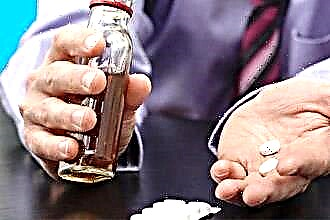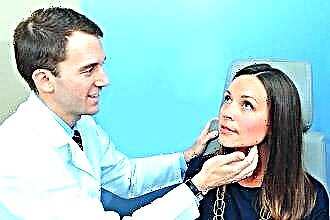Aspirin, a drug with the main active ingredient acetylsalicylic acid, is most often used to relieve pain. But many people think that this remedy prevents the appearance of a hangover, and take the pill during a feast. Unfortunately, this combination of medicine with vodka or other alcoholic beverages can seriously harm the body.
How Aspirin Combines with Alcohol: Mechanism in Simple Words
 Aspirin has many rather serious adverse reactions:
Aspirin has many rather serious adverse reactions:
- epigastric pain, inflammation, erosive and ulcerative damage to the digestive system, which can provoke bleeding and perforation;
- aspirin has an antiplatelet effect on platelets and may increase the risk of bleeding (hematomas, from the nose, from the gums, less often gastrointestinal bleeding);
- immune system: with increased sensitivity to salicylates, there is a risk of developing allergic reactions, urticaria, itching, eczema, bronchospasm, arterial hypotension, in rare cases - anaphylactic shock, Quincke's edema, noncardiogenic pulmonary edema;
- development of transient hepatic failure is possible.
Instructions for use indicate that acetylsalicylic acid is incompatible with alcohol, as this may increase the risk of adverse reactions and other complications.
Alcohol has an irritating effect on the gastric mucosa, and when taken simultaneously with Aspirin, which blocks the production of enzymes that protect the inner layer, the destructive effect is enhanced several times.
When alcohol is consumed, the load on the liver increases, because the breakdown of ethyl alcohol requires a large amount of enzymes and long-term disposal of harmful substances. The combination with Aspirin is hepatotoxic - with chronic alcoholism, the risk of developing liver failure increases.
With moderate consumption of alcoholic beverages, there is a decrease in blood clotting and thrombus formation, which can be considered a positive effect. But there are exceptions (patients at risk of hemorrhage or open wound surfaces) for whom this situation will create problems.
Acetylsalicylic acid with vodka: what are the consequences?
Aspirin and alcohol are a dangerous combination that can provoke very serious and serious consequences and even lead to death.
Possible complications while taking acetylsalicylic acid and alcoholic beverages:
 the appearance of erosions and ulcers of the gastric mucosa;
the appearance of erosions and ulcers of the gastric mucosa;- with an unfavorable history (gastrointestinal disease), a high risk of bleeding;
- severe allergic reactions, anaphylactic shock;
- liver failure.
One of the most dangerous complications is the development of gastrointestinal bleeding. Against the background of trauma to the mucous surface of the organ and the walls of blood vessels, the ability of platelets to aggregate (coagulability) weakens. With the combination of factors such as damaged gastric lining and insufficient coagulation, there is a high risk of bleeding. In this situation, massive blood loss rarely develops, a latent course is more characteristic. The main complaints will be general weakness, low blood pressure, drowsiness, even loss of consciousness. In laboratory tests, anemia is detected.
Aspirin to eliminate a hangover
If a person is shown taking aspirin, then the required dose should be taken no earlier than 2-3 hours before a feast or 5-6 hours after. It is highly undesirable to consume alcohol during the course of treatment with acetylsalicylic acid.
Often in the morning after drinking a large amount of alcoholic beverages, a hangover syndrome occurs, the main complaints of which are: headache, nausea, weakness, and abdominal discomfort. To alleviate the signs of intoxication, it is necessary to take sorbents and replenish the water balance. Symptomatic treatment is also recommended - pain relievers. Acetylsalicylic acid is part of many specialty hangover medications, as this drug can neutralize the effects of alcohol in the bloodstream. Ethanol, when decomposed, provokes microaggregation (sticking) of erythrocytes, blood thickening due to loss of fluid, the formation of microthrombi in the vessels, which causes headache and discomfort, and aspirin has a disaggregant effect and relieves all symptoms, improves microcirculation and relieves pain.
 To eliminate the hangover syndrome, it is recommended to take Aspirin in the form of effervescent tablets. In this form, its concentration is lower and the irritating effect on the stomach is much less, and there is also ascorbic acid in the composition to accelerate the utilization of ethanol. It is important to remember that the dose of the drug should not be more than 300 mg per day, you can drink it only with water. Aspirin is contraindicated in patients with the following pathologies:
To eliminate the hangover syndrome, it is recommended to take Aspirin in the form of effervescent tablets. In this form, its concentration is lower and the irritating effect on the stomach is much less, and there is also ascorbic acid in the composition to accelerate the utilization of ethanol. It is important to remember that the dose of the drug should not be more than 300 mg per day, you can drink it only with water. Aspirin is contraindicated in patients with the following pathologies:
- gastroduodenitis, gastritis;
- erosive and ulcerative diseases of the gastrointestinal tract;
- kidney and liver diseases;
- undergoing hemodialysis;
- hypersensitivity to the components of the drug;
- bronchial asthma;
- treatment with glucocorticosteroids.
If there are contraindications to taking Aspirin and you need to deal with the consequences of drinking alcohol, you can resort to the following procedures: take a cool shower, drink plenty of clean water, follow a diet, with a severe headache, you should drink Ibuprofen.
What to do in case of intoxication after taking Aspirin and alcohol?
There is no safe compatibility between alcohol and drugs. In the best case, the medicinal property of the drug will simply be leveled. But often, such use can cause complications and serious side effects or overdose symptoms. High doses of alcohol with the intake of various medications can provoke allergic reactions, digestive disorders, lead to kidney and liver damage, disrupt the functioning of the central nervous system, and even an epileptic seizure. It is necessary to study the instructions for use of the drug in order to know with which means it is compatible, what the consequences may be and how to provide first aid.
With uncontrolled intake of Aspirin and increased alcohol consumption, intoxication may appear, which is manifested by the following symptoms:
 headache;
headache;- nausea and vomiting;
- increased sweating;
- feeling stunned;
- severe pain in the epigastric region;
- indigestion;
- a decrease in the number of red blood cells and platelets;
- hypotension;
- loss of consciousness.
If signs of an overdose appear, it is necessary to rinse the stomach, take sorbents (activated carbon, Smecta or others), call an ambulance. Already the medical staff makes a decision on additional drug treatment, infusion therapy, the introduction of drugs to increase blood pressure (Adrenaline, Ephedrine, etc.).
Conclusions
Aspirin is an affordable remedy that can help fight pain, fever, and even blood clots. But combining it with alcoholic beverages is very dangerous - the risk of side effects and complications in the form of bleeding and liver failure increases. In case of a sudden deterioration in well-being, an increase in symptoms of intoxication, a disturbance of consciousness due to alcohol consumption, it is necessary to seek medical help, since self-medication can be dangerous to health and life.

 the appearance of erosions and ulcers of the gastric mucosa;
the appearance of erosions and ulcers of the gastric mucosa; headache;
headache;

